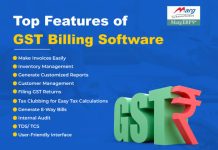Introduction
The Goods and Services Tax (GST) is a significant tax reform introduced in India on July 1, 2017, with the aim of simplifying the complex tax structure and creating a unified tax system across the country. Chandigarh, being a Union Territory, follows the same GST regulations as the rest of India. In this blog, we will explore the nuances of GST billing in Chandigarh, including the basic concepts, legal requirements, and practical considerations for businesses.
Understanding GST
Under GST, all goods and services are categorized into different tax slabs, including 0%, 5%, 12%, 18%, and 28%. Businesses are required to charge the appropriate GST rate on their supplies and collect the tax from customers. GST is a destination-based tax, which means it is levied at the place of consumption. In the case of Chandigarh, which is a Union Territory, the Central GST (CGST) and the Union Territory GST (UTGST) are applicable on intra-state supplies, while the Integrated GST (IGST) is applicable on inter-state supplies.
GST Registration
Businesses in Chandigarh with an annual turnover exceeding the prescribed threshold limit of Rs. 20 lakhs (Rs. 10 lakhs for special category states) are required to register under GST. The registration process involves submitting an online application on the GST portal and providing relevant details such as PAN, Aadhaar, bank account, and business details. Once registered, a unique Goods and Services Tax Identification Number (GSTIN) is assigned, which must be mentioned on all invoices and other relevant documents.
GST Invoice Format
A GST invoice is a document that serves as evidence of the supply of goods or services and contains specific information as per the GST law. The invoice format for businesses in Chandigarh must comply with the GST rules, which include details such as the name, address, and GSTIN of the supplier and recipient, description and value of goods or services, applicable GST rate, and amount of GST charged. The invoice must also clearly mention the words “Tax Invoice” for registered dealers or “Bill of Supply” for composition scheme dealers, as per the applicable scenario.
Time and Place of Supply
The time and place of supply are crucial factors in determining the GST liability. The time of supply for goods is the earliest of the following: (a) date of invoice, (b) date of delivery, or (c) date of receipt of payment. For services, it is the earliest of (a) date of invoice, (b) date of completion of service, or (c) date of receipt of payment. The place of supply for goods is the location where the goods are delivered, while for services, it is the location of the recipient of services. These factors play a significant role in determining the applicable GST rate and the type of GST to be charged.
Input Tax Credit
Input Tax Credit (ITC) is a mechanism that allows businesses to claim credit for the GST paid on their purchases, which can be set off against their GST liability on sales. However, certain conditions need to be fulfilled to avail of ITC, such as possession of a valid tax invoice, receipt of goods or services, payment of GST to the government, and filing of regular GST returns. It is essential for businesses in Chandigarh to diligently maintain records of their purchases and sales, reconcile them with the details mentioned in their GST returns, and claim the eligible ITC to avoid any compliance issues.
Compliance and Penalties
Compliance with GST regulations is crucial to avoid penalties and ensure smooth business operations. Businesses in Chandigarh are required to file regular GST returns, including GSTR-1 for outward supplies, GSTR-2 for inward supplies, and GSTR-3 for the final monthly return. These returns must be filed on time and with accurate details to avoid penalties and interest.
Penalties for non-compliance with GST regulations in Chandigarh can be severe and may include monetary fines, cancellation of GST registration, and even prosecution. For instance, late filing of GST returns can attract a penalty of Rs. 50 per day for CGST and Rs. 50 per day for SGST/UTGST, subject to a maximum of Rs. 5,000 per return. Similarly, failure to issue proper GST invoices, failure to register under GST despite being liable, or incorrect or false information in GST returns can attract hefty fines and penalties.
Additional Resources
For more information on GST billing in Chandigarh, businesses can refer to the following resources:
- The official website of the Central Board of Indirect Taxes and Customs (CBIC) at https://www.cbic.gov.in/.
- The official GST portal at https://www.gst.gov.in/.
- The GST Act and rules available on the official CBIC website.
- Consultation with a qualified chartered accountant or tax professional for expert advice on GST compliance.
By following proper GST billing practices, businesses in Chandigarh can ensure compliance with the GST law, avoid penalties, and contribute to the smooth functioning of the unified tax system in India.
Conclusion
In conclusion, understanding the nuances of GST billing is essential for businesses operating in Chandigarh to comply with the GST law and avoid any legal and financial implications. It is crucial to register under GST, maintain proper invoice formats, comply with the time and place of supply provisions, avail of eligible ITC, and file regular GST returns on time. Non-compliance can result in severe penalties, fines, and legal consequences, which can negatively impact the business operations. Therefore, businesses in Chandigarh must ensure proper GST billing practices and stay updated with the changing GST regulations to ensure smooth and compliant business operations.
Read more useful content:






